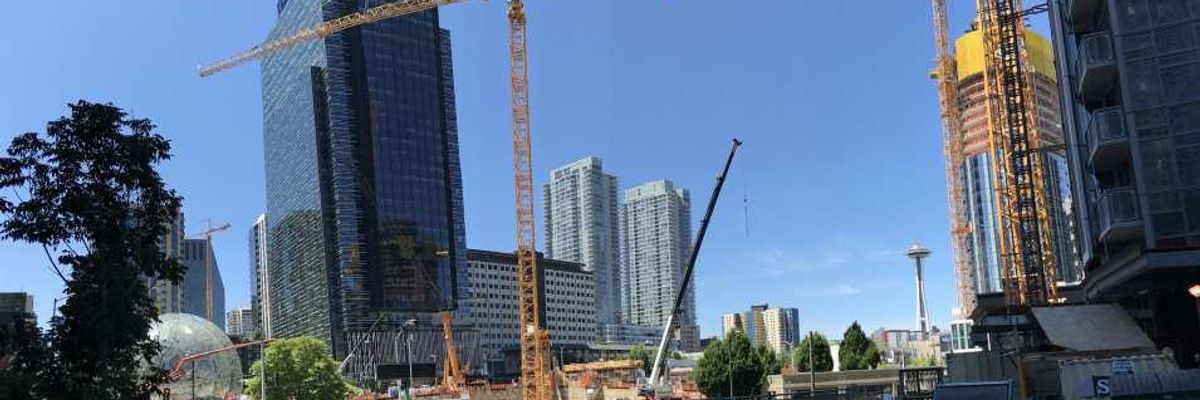While business-friendly politicians applauded Amazon's decision to establish two new headquarters in New York and just outside Washington DC, local officials, residents, and critics of the "race to the bottom" the $800 billion corporation held in its search for new office locations denounced the move on Tuesday, decrying the effects the new headquarters will likely have on the chosen cities.
After a 14-month-long process in which Amazon pitted cities against one another in a competition to see who would offer the company the most enticing tax incentives and other perks, the neighborhoods of Long Island City in Queens, New York and Crystal City in Arlington, Virginia were named as Amazon's new second and third homes.
Using the hashtag #HQ2Scam, journalists and critics condemned New York Governor Andrew Cuomo, New York City Mayor Bill DeBlasio, and Virginia Governor Ralph Northam--all Democrats--for their desperate attempts to woo Amazon with tax breaks at the expense of their constituents.
New York offered more than $1.5 billion in "performance-based" tax breaks to the company, while Virginia offered $573 million, with officials from both states applauding the company's promise to bring jobs to both states.
New York City Council members were among those who asked why Amazon--headed by the world's richest man, Jeff Bezos--is in need of tax incentives at all from a state where 5.5 million daily commuters face frequent delays due to the city's decaying subway system and the lack of affordable housing has reached a "crisis point."
"I also don't understand why a company as rich as Amazon would need nearly $2 billion in public money for its expansion plans at a time when New York desperately needs money for affordable housing, transportation, infrastructure, and education," Speaker Corey Johnson said in a statement.
"New Yorkers have real unmet needs from their government," added City Council member Jimmy Van Bramer and State Senator Michael Gianaris, who represent Long Island City. "It is unfathomable that we would sign a $3 billion check to Amazon in the face of these challenges."
Johnson also decried DeBlasio and Cuomo's failure to seek input from the public as they forged ahead with their attempts to convince Amazon to come to New York--now mirrored by the company's evasion of the city's public land review process.
"You can't put a price on community input, which has been missing throughout this entire process," Johnson said. "I find that lack of engagement and the fact that negotiations excluded the City Council--which is elected by New Yorkers to guide land use projects with communities in mind--extremely troubling."
While DeBlasio celebrated the so-called "synergy" which will result from Amazon's new proximity to the nation's largest public housing development, weary locals spoke of their previous experiences when other large corporations opened locations in the area.
"What are they going to do for the community? Are they going to guarantee us employment opportunities?" April Simpson, the president of Queensbridge Tenants Association in Long Island City told the New York Times. "I'm worried about, when they come, they're not going to have opportunities for people."
Other multinational companies that have arrived in the area in recent years "did not hire here--they brought in their own people," Simpson added. "My thing is: If you build here, hire here."
While officials applaud Amazon's decision, residents of Long Island City and Crystal City need only to look to Seattle for a preview of the numerous harms the corporation's presence has done to the city. Housing prices there have doubled over the last six years, while frequent construction has caused some of the worst traffic congestion in the country. The company has also shown little interest in using its vast resources to help better the city, lobbying against a relatively modest corporate tax to help combat the affordable housing crisis and provide services for homeless people.
At Splinter, journalist Hamilton Nolan argued that no company should be able to hold nationwide competitions demanding tax incentives from cities, taking city and state leaders' attention away from the families they're elected to serve and focusing it on wooing a wealthy corporation--and that the only way to stop another "race to the bottom" is to make such subsidies illegal.
"The problem is that as soon as one place offers a company tax breaks, everywhere has to," Nolan wrote. "The only way for public--you and me and every other taxpayer and city and state government who all have much more pressing things to spend money on than bribes to Fortune 500 companies--to win this game is not to play. Nobody can play. The way to accomplish this is simple: We need a federal law banning these sorts of subsidies."

